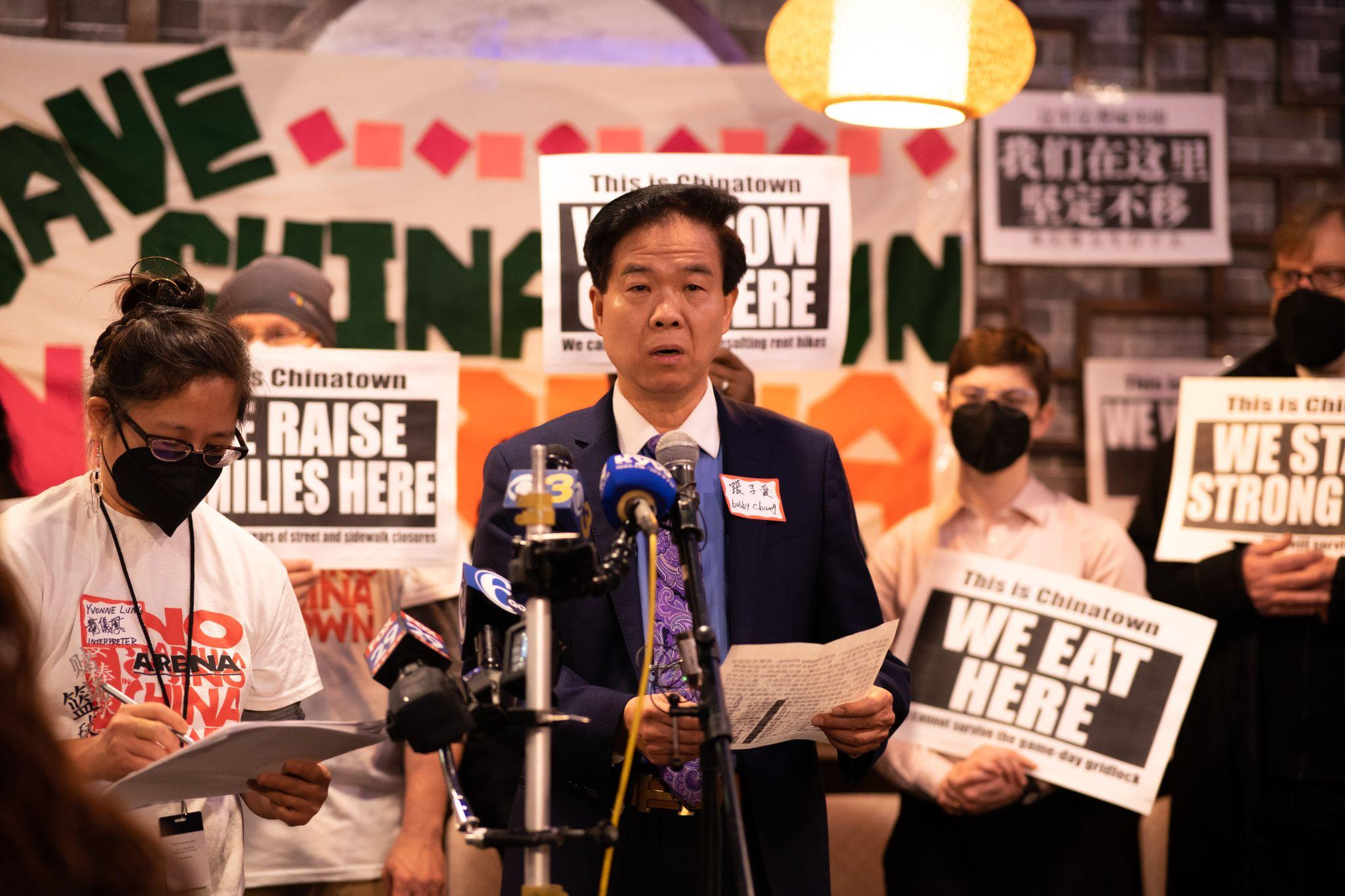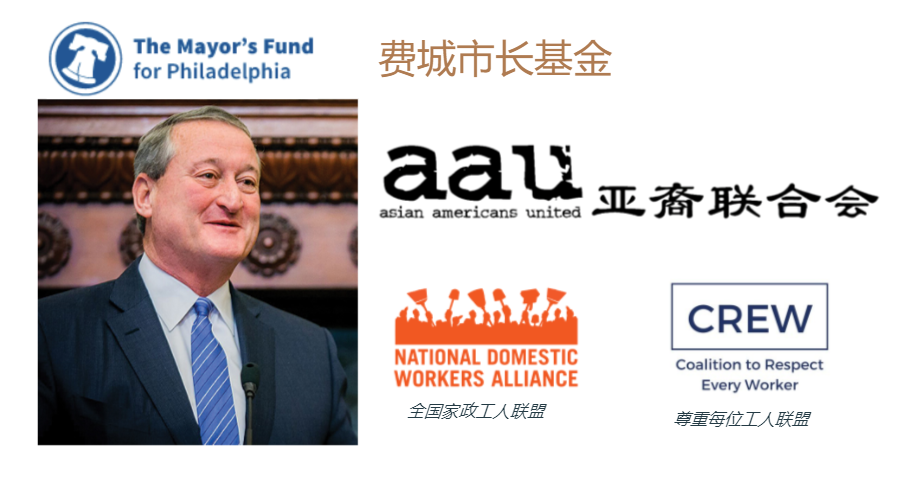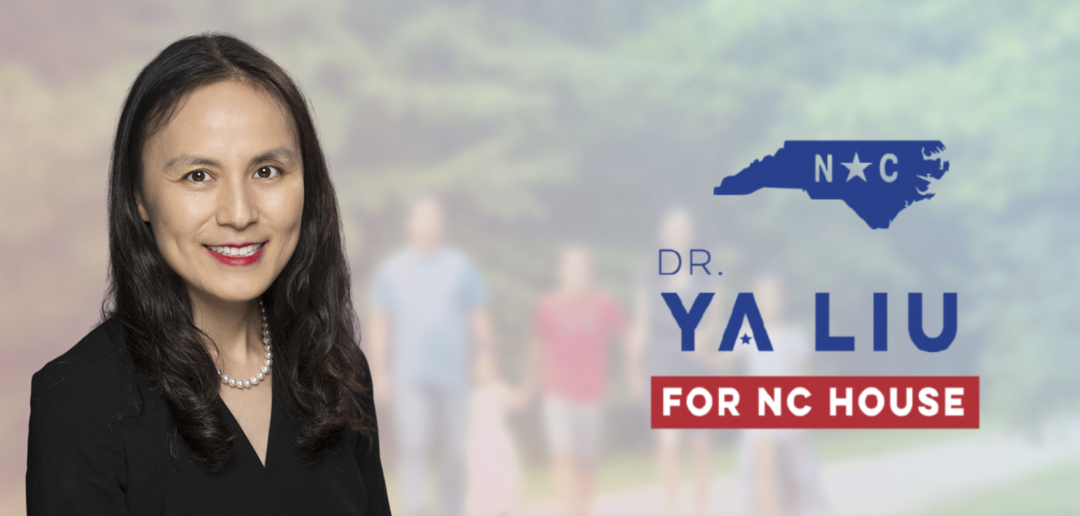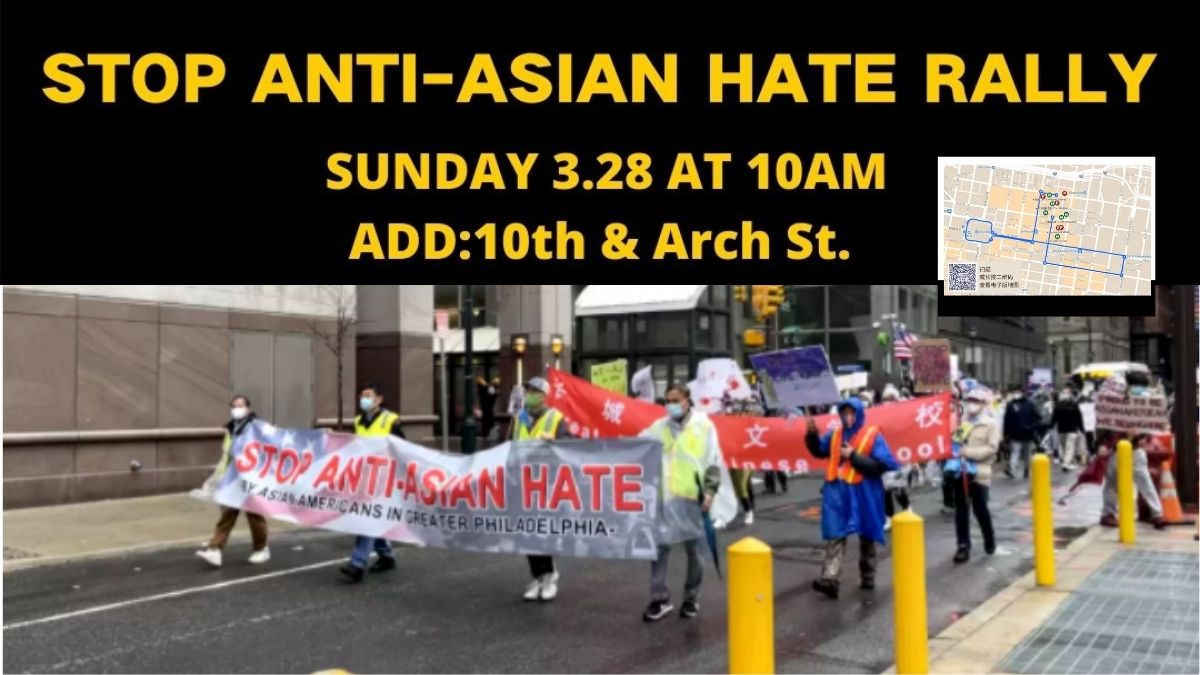拯救华埠联盟和华反篮球场联盟的成员以及几位唐人街企业主在Narasimha (Nick) B. Shenoy和Drake Nakaishi的领导下会见了费城亚美商会,表达了他们对76Place篮球场计划的反对。他们敦促亚美商会支持唐人街企业主的意愿,反对这项计画。

显然,篮球场开发商正在利用商会来达到自己的政治目的,以「证明」亚裔美国人支持他们的提议。联盟将这封信发送给亚洲商会。它明确指出该商会不代表唐人街。
虽然任何个人或组织都可以与开发商达成“协议”,但这将以牺牲数百家唐人街小商户的利益和唐人街作为一个社区的存在为代价。费城亚美商会将被毫不含糊地告知——他们不代表唐人街,如果他们让自己成为 76Place 开发商压制我们唐人街社区声音的藉口,他们应该感到羞耻!
致费城亚美商会信件如下
尊敬的商会:
我们希望向你们表示感谢,谢谢你们愿意抽出时间与我们见面。拯救华埠联盟(Save Chinatown Coalition)和反对球馆华埠联盟(Chinatown Coalition to Oppose the Arena)的80多个组织,以及加入支持华埠存在的餐饮业及小企业联盟(Restaurant Industry and Small Businesses for Chinatown’s Existence,简称RICE)的来自费城各地的86个小企业集体反对篮球馆项目,并且认为该提案威胁到了我们唐人街的存在,费城唐人街有着150年的历史,它是我们亚裔美国人在该地区的生活中心。
费城华埠发展会(Philadelphia Chinatown Development Corporation)的企业调查中发现93%的企业反对该项目,94%的社区居民同样反对该项目。唐人街的企业依赖常客的光顾 – 而这些常客大多数是三州地区的亚裔。虽然开发商说过他们会“协助营销”,但是能帮助增加日常生意的不是营销,而是畅通无阻。让车辆能畅通无阻的从唐人街进出,以及提供充足和经济实惠的停车选择才是促进生意的主要元素。还有,当地企业主要依靠货物和材料的及时送达来顺利运转。最后,在餐饮业方面,据唐人街企业所报,疫情之后至少30%的生意是外卖或者送餐的单子 – 两者都要求停车方便和道路畅通。
拯救华埠委员会的规划委员会包括几位专业的城市规划师,建筑师,大学教授,以及前任费城市街道管理局局长。他们仔细研究了开发商做的交通调查分析。即便该调查是基于远非保守的假设,但是该调查表明了,球馆办活动时,唐人街周围的交通将堵塞街道,使街道需要被封闭,并且在办活动的那几天会占用街边的停车位。该调查文件表明,唐人街周围的5个主要交叉路口将降级到“E或者F等级” – 也就是说,他们将成为拥堵到无法通行的情况。这些情况不是“营销”能解决的问题。
此外,唐人街的小企业不仅仅是餐馆。我们三州地区的亚裔依赖费城唐人街作为获得语言上和文化上的无障碍服务的中心,从发廊到保险公司,旅行社,医生,牙医,等等。这些企业满足了我们广大亚裔美国人社区的特殊需求,可是它们也会因为该提案而受到影响。
这些影响还未包括提案中的六年建筑工程和工程本身带来的交通问题,以及影响我们的居民和工人,使我们社区的健康受到影响的环境健康问题。我们社区深得大量老年人的喜爱,他们每日都会来这里和朋友相聚,逛街和在这个对他们的文化给予肯定的环境中参加活动。我们的社区还设有两间小学和四间教堂。我们社区中的老年人和小孩子是最容易受到呼吸道损伤的群体,而六年的建筑工程无疑会使情况恶化。
我们痛切地知道,开发商曾表示他们愿意与社区“合作”,以解决反亚裔仇恨的问题。我们认为这很讽刺,因为在该项目中,他们有意识地在驱使黑人社区与我们亚裔社区对立。我们的许多非裔美国人盟友都说过此事,并且公开反对了这种公然试图引起群体之间的矛盾的行为。我们鼓励商会,认真考虑开发商在这方面所采取的做法对亚裔美国人社区的影响。
虽然我们的社区一直都在试图开发可承担型住房,但是“可承担”这个词的定义有很多。当我们的社区说起可承担型住房时,开发商突然间(依据他们所呈交的图纸)就在他们的球馆后方加了一栋带有350个单元的20多层高的公寓楼。这栋公寓楼将紧贴着我们唐人街的第一家店 – 简直和它成为排屋了 – 而这家店只有两层楼高。很明显,这个设计欠缺考虑,而且如此巨大的高楼大厦将阻挡唐人街南北通道的所有视线。另外,当我们向开发商问道他们是如何定义“可承担”这个词的时候,他们拒绝回答。“可承担”并不代表所有的社区都可以承担的起,这是有据可查的,而作为房地产开发商,他们非常清楚这一点。
作为小企业主和拯救华埠联盟及反对球馆华埠联盟的成员,我们反对该篮球馆提案。我们相信,商会知道商会无法在这件事上代替唐人街发言。我们都知道,即便他人将我们亚裔美国人社区视为一个整体,我们是多元化的,并且每个社区都有它自己独特的需求。我们也希望,亚美商会(Asian American Chamber of Commerce)的宗旨 – 支持和促进亚裔美国人企业 – 会倾听唐人街的94%的业主的心声,并且反对这个篮球馆项目。
很明显,球馆的开发商在利用商会达到他们自己的政治目的,以此“证明”亚裔美国人支持他们的提案。我们希望你们能慎重考虑,你们的发言正在被如何利用 – 无论是在媒体上,还是在开发商的公开演示中 – 请考虑开发商是如何企图利用你们的言论去构造出唐人街企业支持这项提案的幻象。虽然任何一位个人或者任何一个个体组织都可以和开发商达成一份“协议”,但是这样的举动是以数百个小型家庭企业和唐人街社区本身的存在作为代价。我们已经将相关信息的文件发送给你们,里面的内容是经过充分的调查研究,而且我们对该提案的调查分析所涉及的专业知识不仅仅是给了一份“意见” – 而是一份来自业内专家的可信证据。
我们希望你们会尊重那些因该开发项目而最直接受到影响的企业和组织的权力,尊重他们是否支持该球馆项目的话语权,以及和开发商的任何形式的谈判的话语权。
我们很清楚,有一些陈述可能会被断章取义以及,又或者,会被误解。因此我们认为,在这种情况下,商会及时澄清对其言论的任何错误的陈述,这样做很重要。
签署人:
宾州华人侨团联盟,沈丕权、朱枫、王玉明
大费城华人餐馆协会,会长: 朱枫
美国费城福建猴屿联谊会,会长: 张子钟
美国猴屿民俗文化中心,董事长: 张文钦
美国费城妈祖文化交流协会,会长: 林应章
大费城华人工商联合总会,会长: 李东闽
宾州广西同乡会,执行会长:李世鹏
大费城连江同乡会,会长: 卢端金
美国东北同乡会,会长: 刘启明
大费城福建同乡会,会长: 杨道峰
费城京剧社,会长: 李新华
美国闽南亲友联谊总会,会长: 黄炜秋
费城中国文化海外交流协会,会长: 徐福群
宾州福建商会,会长: 陈展远
北美莆田乡亲联谊会,会长: 许世琼 博士
费城华人协会,会长: 方吕立
国际海峡文化交流总会,会长: 张子爱
费城梅洋香炉牛项三乡联合会,会长: 吴水淞
美国费城妇女联合会,会长: 林玉金
宾州华商会 ,会长: 杨剑峰
宾州四川同乡会,会长: 徐涛
世界孙中山基金会,会长: 彭伟权
两岸和平发展论坛,会长: 陈启庄
圣·约瑟夫大学中国语言文化中心,主任: 喻娟
宾州华人工商联合总会,董事长: 曾庆绍
费城台湾同乡联谊会,会长: 浦静芳
大费城陜西同乡会,会长: 张西川
宾州亚裔联谊会,会长:张城彬
旅美科协费城分会,会长:郑荣
美国福建闽候工商总会,会长: 池洪贵
大费城印尼华侨联谊会,会长: 李斌裕
凯德慈善基金会,会长: 江典敏
福建晋江青年联谊会,会长: 吴锦钊
费城长乐公会,会长: 丁彬彬
美国华人建筑公会-费城分会,会长: 李琪
费城华埠龙舟队,队长: 陈威
Dear Members of the Asian American Chamber of Commerce of Greater Philadelphia:
We wanted to express our appreciation for taking the time to meet with us. The 80+ organizations in the Save Chinatown Coalition and the Chinatown Coalition to Oppose the Arena in addition to the 86 small businesses from around the city who have joined RICE (Restaurant Industry and Small Businesses for Chinatown’s Existence) are all opposing this project, and recognize this proposal as an existential threat to the 150-year-old center for Asian American life in this region.
The Philadelphia Chinatown Development Corporation’s survey of businesses found 93% of the businesses opposed to this project, as are 94% of the residents in the community. The Chinatown businesses rely on regular customers – mostly Asians from the tri-state area. While the developers have said they would “assist with marketing”, it is not marketing that will facilitate the increase in regular business, it is accessibility. The ability for cars to travel in and out of Chinatown and for the availability of plentiful and affordable parking options is the primary driver. As well, businesses rely heavily on timely delivery of goods and supplies. Finally, for the restaurant industry, the businesses in Chinatown report that since COVID, at least 30% of their business is take out or delivery – both of which require the ability to have parking and easy access.
The Planning Committee of the Save Chinatown committee includes a number of professional urban planners, architects, professors and the former City of Philadelphia Streets Commissioner. They have carefully studied the transportation analysis which was done by the developers. Even though the study operated from assumptions which were far from conservative, the study shows that the traffic around Chinatown during events will block streets, necessitate street closures, and take on street parking on the days of the events. The document shows that 5 major intersections around Chinatown will drop to an “E or F rating” – meaning that they will become impassable. These are not conditions that can be solved through “marketing.”
Furthermore, Chinatown small businesses are more than restaurants. Asians across the region rely on the ability to access linguistically and culturally accessible services from hair salons to insurance companies, travel agents, doctors, dentists and more. These are businesses that cater to the particular needs of our broader Asian American community and they will be impacted by this as well.
This does not account for the six years of construction that will take place and bring their own traffic issues as well as expose the community to health impacts from construction that will affect our residents and workers. Our community attracts a large number of senior citizens who come daily to meet friends, shop and engage in activities in a culturally affirming setting. We also house two elementary schools and four churches. The elderly and the children in the community are the most vulnerable for respiratory damage which six years of construction will undoubtedly exacerbate.
We are painfully aware that the developers have touted their willingness to “partner” with the community to address anti-Asian hate. We find that this is ironic as they have consciously sought to pit the black community against the Asian community in regard to this project. Our many African American allies have themselves spoken out about this and have decried these blatant attempts to foment inter-group tensions. We encourage the Chamber to seriously consider the implications to the Asian American community of the approach of the developers in this regard.
While the community has consistently sought the development of affordable housing, the word “affordable” has many definitions. When the community talked about affordable housing, the developers suddenly added a 350 unit 20+ story apartment complex on the back of their arena (according to the drawings they presented). This building will abut – literally be a row house to – our first business, which is a two story building. It is clear that this is not a thoughtful design and such a massive tower will block all sight lines for the north south corridor of Chinatown. In addition, when we asked the developers to define what they mean by “affordable” they have refused to answer. It is well documented that “affordable” does not mean affordable to all communities, and as real estate developers, they are well aware of this.
As small business owners and members of the Save Chinatown Coalition and the Chinatown Coalition to Oppose the Arena, we oppose this arena. We trust that the Chamber recognizes that it cannot speak for Chinatown in this matter. We all know that while others view our Asian American community as monolithic, we are diverse and each community has its own unique needs. We also hope that the purpose of the Asian American Chamber of Commerce – to support and promote Asian American businesses – will listen to the 94% of business owners in Chinatown and oppose this project.
It is clear that the arena developers are using the Chamber for its own political purposes to “prove” that Asian Americans support their proposal. We hope you will carefully consider how your words are being used – both in the media and in the developers’ public presentations – to give the illusion that Chinatown businesses are in support of this proposal. While any single individual or single organization may secure an “agreement” with the developers, this would be at the expense of hundreds of small family owned businesses and the very existence of Chinatown as a community. We have sent documentation to you which has been well researched and the expertise involved in our analysis of the proposal represents more than an “opinion” – it is credible testimony from experts in the field.
We hope you will respect the right of the businesses and organizations most directly affected by this development for the right to make a decision whether or not to support this arena and to make decisions regarding any type of negotiations with the developers.
We are well aware that statements can be taken out of context and/or misconstrued. For that reason, we think that in these cases it is important for the Chamber to promptly clarify any misrepresentation of its statements.
Sincerely,
Xu Lin – Owner, Bubblefish Restaurant
Derek Sam – Owner, Little Saigon Cafe
Mike Ha – Owner, QT Sandwich Shop
Save Chinatown Coalition Representatives
Mohan Seshadri – Asian Pacific Islander Political Alliance
Debbie Wei – Asian Americans United
Chinatown Coalition to Oppose the Arena Representatives
Piquan Shen, Stevent and YuMing Wang
Pennsylvania United Chinese Coalition
Steven Zhu, President
Chinese Restaurant Association of Greater Philadelphia
Dongmin Li, President
Greater Philadelphia United Chinese American Chamber of Commerce
Jianfeng Yang, President
The Pennsylvania Chinese Businesses Association
Zizhong Zhang, President
Philadelphia Hoyu Chinese American Association
Wenqin Zhang, Chairman
Hoyu Chinese Folk Culture Center
Dr. Yingzhang Lin, President
Philadelphia Mazu Culture Exchange Association
Shipeng Li, Executive Chairman
Guangxi Association of Pennsylvania
Duanjin Lu, President
Greater Philadelphia Lianjiang Association
Qiming Liu, President
Chinese Northeast Association of USA
Daofeng Yang, President
Greater Philadelphia Fujian Association
Xinhua Li, President
Philadelphia Chinese Opera Society
Weiqiu Huang, President
Southern Fujianese Friendship Association of USA
Fuqun Xu, President
Philadelphia Overseas Chinese Culture Exchange Association
Allan Chen, President
PA Fujian Chamber of Commerce USA
Dr.Shiqiong Xu, President
North American Putian Association
Luli Fang, President
A&C Assoc Philadelphia INC
Bobby Chang, President
International Strait Cultural Exchange Association
Yujin Lin, President
American Philadelphia Chinese Women Association
Tao Xu, President
The Pennsylvania Sichuan Association
Weiquan Peng, President
World Sun Yat-Sen Foundation
Qizhuang Chen, President
Cross-Strait Peaceful Development Forum
Juan Yu, Director
Saint Joseph University Chinese Cultural Center
Qingshao Zeng, Chairman
Pennsylvania United Chinese Chamber of Commerce
Jingfang Pu, President
Philadelphia Taiwan Association
Matt Zhang, President
Greater Philadelphia Shaanxi Association
Chengbin Zhang, President
Asian American Fellowship of Pennsylvania
Rong Zheng, President
Chonggui Chi, President
American Fujian/Ming Huo Chamber of Commerce
Binyu Li, President
Greater Philadelphia Indonesian Chinese American Association
Dianmin Jiang, President
Kind Foundation
Jinzhao Wu, President
Fujian JinJiang Youth Association
Binbin Ding, President
Change Association of Philadelphia
Ricki Li, President
Asian American Construction Professionals-Philadelphia Chamber
Shuisong Wu, President
MXN Fellowship Association of America
Wei Chen, Captain
Philadelphia Chinatown Dragon Boat Team




